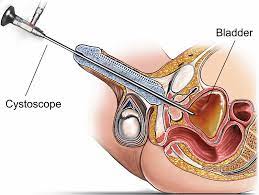Cystoscopy: Inspect Urethra and Bladder
Dr. Aman Priya Khanna

Treatment Duration
5 Minutes
------ To ------15 Minutes
Treatment Cost
₹ 5,000
------ To ------₹ 20,000

You can check Diagnostic Cystoscopy Cost here.
Cystoscopy Procedure
Cystoscopy is a procedure that allows your doctor to examine the
- Lining of your bladder
- Urethra ( A tube that carries urine out of your body)
- A hollow tube (cystoscope) equipped with a lens is inserted into your urethra and slowly advanced into your bladder.
If the procedure is not done on time:
- If the procedure is not done on time, it can lead to a worsening of the bladder related issue.
- While there are technically some alternatives to cystoscopy such as Imaging studies, CT scans or ultrasound but they aren’t as effective as cystoscopy and can miss diagnosing tumours and lesions.

Diagnostic Cystoscopy Videos by HexaHealth
Expert Doctors (10)
NABH Accredited Hospitals (10)


Benefits of Cystoscopy
- Cystoscopy can help find problems with the urinary tract.
- This may include early signs of cancer, infection, narrowing, blockage, or bleeding.
Who needs cystoscopy procedure?
You might need to get a cystoscopy for the following reasons:
- To diagnose and monitor different bladder related issues such as bladder stones, cystitis (bladder inflammation), or cancer.
- To check if you have an enlarged prostate. By passing ,a cystoscope through the urethra, a doctor can check if there is a narrowing of it. A narrowing of the urethra indicates an enlarged prostate.
- To treat different bladder-related diseases and issues. Through cystoscopy, certain tools can be passed to help treat conditions, for example, cystoscopy can be used to remove small tumours from the bladder.
- To look into possible causes of the signs and symptoms that you have been showing. For example, in case of painful urination or blood in the urine, cystoscopy may be done to help find out the root cause of it.
- Sometimes with a cystoscopy doctors also conduct a procedure called ureteroscopy; ureteroscopy examines the urine carrying tubes that connect your kidney and bladder.
Cystoscopy procedure
Before the Procedure:
- To prepare for the procedure:
- Firstly you may be asked to take certain antibiotics by your doctor. This is to ensure that there is no active infection during the procedure, and that you do not get any infection due to the procedure.
- You may be asked to give a urine test before the procedure.
- In case you are to be given a sedative or some kind of a general anaesthetic during the procedure, make sure you have someone to take you home after.
During the Procedure
- The procedure usually takes about 5 to 15 minutes. In the case of sedation, it takes around 15 to 30 minutes. During the procedure, the following steps are followed.
- Firstly before starting, you are asked to empty your bladder, i.e you are asked to pee.
- Once that is done you are to lie down on a table. Your legs are opened and your feet are put up in stirrups.
- Based on the specific case, you will be administered a sedative or anaesthetic.
- The doctor then applies the numbing cream to your urethra to ensure you don't feel pain when the cystoscope is inserted. After a few minutes, the cystoscope is slowly pushed into your urethra. In most cases, the smallest possible scope is used. In certain cases such as where surgical tools need to be passed, or some tissue samples have to be taken, a larger scope may be used.
- Once the cystoscope has been inserted, using the lens on it your doctor will take a look at the surfaces of your bladder and urethra and examine the same; the lens on the cystoscope magnifies the inner surfaces helping the doctors take a good look. The image from the cystoscope may be put on a video screen by your doctor.
- Post that your doctor will fill your bladder with a sterile solution, which allows your doctor to examine your bladder properly as the solution inflates your bladder. During this part of the procedure, you might feel like urinating.
- In situations where the purpose of the procedure is to take tissue samples your doctor will take the required samples, or in cases where the cystoscopy is being done to insert surgical tools, the doctor will perform the required procedure.
- Finally, the cystoscope is then carefully taken out.
Recovery and Post op care after Cystoscopy procedure
After the procedure.
Post the procedure you may face some side effects.
While the side effects commonly associated with cystoscopy are low-grade, they do exist. They are:
You might find some blood in your urine, however, this occurs for a very short period.
You may experience some mild abdominal pain as well as a mild sensation of burning while urinating. These side effects also tend to last for a very short period and get better soon after the procedure.
Wanting to frequently urinate.
Rare Side effects of the procedure
Rare Side effects:
While cystoscopy is a generally safe procedure and it is extremely rare to have any serious side effects after a cystoscopy, here are some possible serious side effects:
- Sometimes a cystoscopy leads to an infection, usually a urinary tract infection.
- Issue related to general anaesthetic if it is used.
- Being unable to urinate post the procedure.
- Blood clots in urine or bright red blood in the urine.
- Intense abdominal pain and feeling nauseous.
- Testicular pain and swelling
- Getting chills
- Getting a fever of over 101.4 Fahrenheit.
- Burning sensation during urination for more than two days.
- A tear or perforation in the urinary tract.
- In case of the abovementioned, call your doctor immediately or go to the closest emergency room.
Diagnostic Cystoscopy Cost Videos
Last Updated on: 13 October 2025
Reviewer

Dr. Aman Priya Khanna
MBBS, DNB General Surgery, FMAS, FIAGES, FALS Bariatric, MNAMS General Surgery
13 Years Experience
Dr Aman Priya Khanna is a highly experienced and National Board–Certified Laparoscopic, GI, and Bariatric Surgeon with over 13 years of clinical expertise.
He is widely regarded as one of the best bariatric surgeons in Ahmedabad, ...View More
Author

Sparshi Srivastava
B.Tech Biotechnology (Bansal Institute of Engineering and Technology, Lucknow)
2 Years Experience
An ardent reader, graduated in B.Tech Biotechnology. She was previously associated with medical sciences secondary research and writing. With a keen interest and curiosity-driven approach, she has been able to cont...View More
Latest Health Articles


























